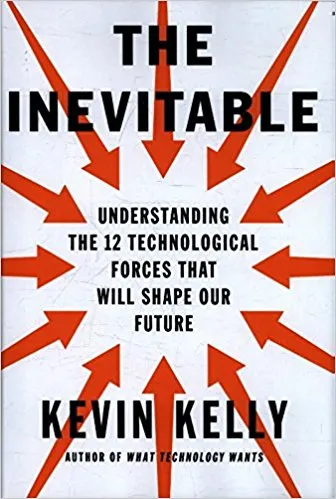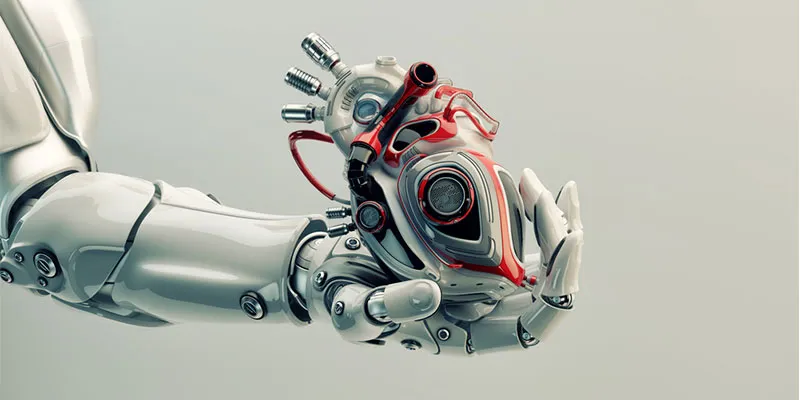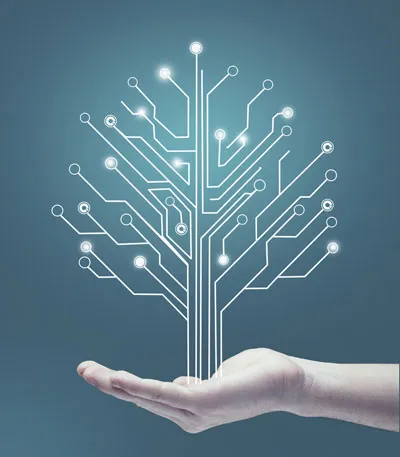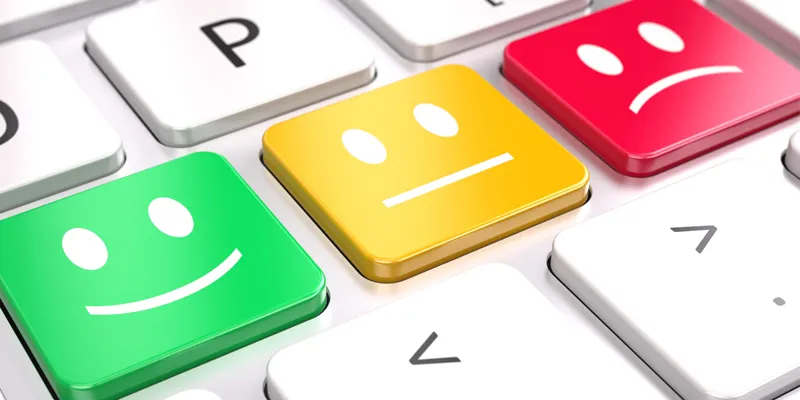Digital disruption: the 12 converging tech forces that are transforming media, jobs, services, and more
Rather than describing the future with a list of technologies such as AI or IoT, ‘Wired’ magazine editor Kevin Kelly does a compelling job of showing how tech convergence is leading to 12 inevitable forces: becoming, cognifying, flowing, screening, accessing, sharing, filtering, remixing, interacting, tracking, questioning, and beginning.

“We are morphing so fast that our ability to invent new things outpaces the rate we can civilise them,” begins Wired’s editor Kevin Kelly, in his gripping new book The Inevitable: Understanding the 12 Technological Forces that will Shape our Future. The chapters in the 2017 Penguin imprint are spread across 330 pages and are thoroughly referenced.
Kelly’s other books include New Rules for the New Economy and What Technology Wants. See also YourStory’s reviews of the related books Connected by Design, Industries of the Future, Code Halos, Big Data Revolution, and Peers, Inc.
Industries will topple, new competitors will emerge, and entire occupations will disappear. “New occupations will be born and they will prosper unequally, causing envy and inequality,” Kelly cautions. It is hard to push back against these driving forces, but we need “vigilant acceptance.”
“Technology is human’s accelerant,” says Kelly. We are moving in a state of continuous flux, with products becoming services and processes, and even nouns becoming verbs. “These forces are trajectories, not destinies. They offer no predictions of where we end up,” he explains. It is up to us to recognise and reorganise ourselves around these forces, as described below.
- Becoming
“Technological life in the future will be a series of endless upgrades. And the rate of graduation is accelerating,” says Kelly. “We will be newbies forever. That should keep us humble. Endless Newbie is the new default for everyone, no matter your age or experience,” he jokes.
This, of course, will be hard, uncomfortable and painful. Rather than utopia or dystopia, we are in a state of “protopia” or constant motion. A typical reaction is to dismiss some of these changes, but we all know how the early clunky text-only Internet transformed within years.
We are in an era of a new type of thinking – part machine, part human, with instant access to the world’s connected information, with much of the content generated by individuals rather than institutions. The web is now more a presence than a place. “By 2050 we’ll come to think of the web as an ever-present type of conversation,” says Kelly.
This is the best time to start up, to invent something. “We are all becoming. It is the best time ever in human history to begin. You are not too late,” he says.

- Cognifying
“It is hard to imagine anything that would ‘change everything’ as much as cheap, powerful, ubiquitous artificial intelligence,” says Kelly. “The advantages gained from cognifying inert things would be hundreds of times more disruptive to our lives than the transformations gained by industrialisation,” he adds.
AI is now powered by cheap parallel computation, big data and better algorithms, with rapid advances being made in companies from the US to China. AI gets better and better with more usage; Google is using AI to improve its search and search to improve its AI. Cognification will happen in arts, performances, laundry, marketing, real estate, nursing, toys, sports and even in robo-car ethics.
New kinds of minds, intelligences and consciousness will emerge. “To demand that AI be humanlike is the same flawed logic that artificial flying will be birdlike, with flapping wings. Robots, too, will think different,” says Kelly.
Impacted jobs will be of four types: those that are better done by robots than by humans, not doable by humans, jobs not imagined yet, and jobs humans want to give up. “The greatest benefit of the arrival of AI is that AIs will help define humanity. We need AI to tell us who we are,” he says.
There will be massive upheaval, but it is inevitable. “Let the robots take our jobs, and let them help us dream up new work that matters,” he recommends.

- Flowing
The Internet is an endless copying, sharing and flowing machine. Real-time flows, streams and tags are more important than pages, browsers and links. The cloud of copies has steamrolled industries like music, and transformed books. For example, definitions of printed page, fixed content, physical location, lack of interactivity, and fixed editions have been upended.
What people value in this era of flow is immediacy, personalisation, interpretation, authenticity, accessibility, embodiment, patronage and discoverability. Flows and unbundling allow innumerable consumers to tag, annotate, translate, mash up and enliven content such as media and music. Brands will become valuable through their trust, authenticity will be certified by digital watermarks, fans will pay to attend live performances.
- Screening
“We are now People of the Screen,” says Kelly. Flows bring content and interaction to countless screens, and we are “screening” rather than just reading. Screening will change books, music, movies, education, games and eventually everything. Some screens will even be just one word wide.
The web’s great attraction is miscellaneous pieces loosely joined. Book-related activities will becoming “booking” – researching, sharing, socialising. “No book will be an island. It will all be connected,” says Kelly. There will be one large “metabook” - the universal library, the dynamic inter-linked digital-age version of the library of Alexandria.
AI and humans will both tag content. “The link and the tag may be two of the most important inventions of the last 50 years,” says Kelly. Books will no longer sit alone, they will come alive on innumerable screens; they will become a platform for cultural life, not just a better searchable library.

“Books were good at developing a contemplative mind. Screens encourage more utilitarian thinking,” according to Kelly. Book reading strengthens analytical skills; screening encourages association and pattern-matching. Screens are instruments of the now – and will also watch us.
- Accessing
“Possession is not as important as it once was. Accessing is more important than ever,” says Kelly. Instant borrowing is made possible by digitisation, real-time on-demand services, decentralisation, and cloud-based matchmaking platforms. The software-as-a-service model has been extended to accommodation, tools, clothes, furniture and toys, and delivers freshness, flexibility and agility to consumers.
Startups are offering on-demand services for flower delivery, gardening, laundry, house calls, coding/design, and even legal marijuana delivery. Blockchain will even decentralise money and trust-based mechanisms. “Expandable cloud computing at discount prices has made it a hundred times easier for a young technology company to scale up,” says Kelly.
- Sharing
The borderless Internet has created new kinds of community culture. “Digital socialism is socialism without the state,” explains Kevin. Peer production and linkages have created a new version of the sharing economy, or ‘dot communism’ (according to John Perry Barlow). “Community sharing can unleash astonishing power. The power of sharing is bigger than we expected,” says Kelly. The small glitters can become solid gold when aggregated in a community.
Coordination has progressed to cooperation, then collaboration, and finally collectivism, explains Clay Shirky (Here Comes Everybody). Examples include Pinterest, Reddit, Twitter, Wikipedia, Apache, Craigslist, PatientsLikeMe and KickStarter. “Seemingly impossible things can be accomplished by peers of amateurs when connected smartly,” explains Kelly.

There are crowdfunding sites now for musicians (PledgeMusic), non-profits (Fundly), medical emergencies (GoFundMe) and science (Petridish). Innovation itself can be crowdsourced, as shown by Quirky+GE, TopCoder, Threadless, 99Design - leading to new models of ‘crowd-organising’ and ‘crowd-making.’
Vitamin-like doses of curators and influencers also play an important role here. “Intermediaries of some type are needed to shape the cloud of creativity that boils up from the crowd,” explains Kelly. There will also be some con artists, but they can be addressed by features like rating/ranking, insurance pools and escrow funds.
- Filtering
The explosion of content and flows open up new kinds of opportunities for filtering: gatekeepers, curators, brands, friends, cultural environment and even government. Technical filters include search engines, recommendation engines and collaborative filtering; commodity attention is transformed into personalised attention for multiple parties (eg. viewers, advertisers, publishers).
“We are at the threshold of a Cambrian explosion in attention technology,” observes Kelly. Users will also take their own crack at designing ads, which companies can then crowd-source. There are many emerging forms of untapped attention, and a “blank continent” is opening up; there will be even filters upon filters. Filters will ultimately define who we are in terms of preferences.
- Remixing
“We live in a golden age of new mediums. We are in a period of productive remixing,” says Kelly. Morphing, recombining and cross-breeding will apply not just to mainstream media but user-generated content as well. Fan fiction and fantasy universes will create new kinds of content. The best works may be those that are remixed the most – but there will also be challenges to existing IP regimes; transformation is a new kind of becoming.

Tools like SketchUp offer major virtual models of major building structures around the world. Literacy is more than reading books, but being able to use digital tools well. “Database cinema” will allow people to create videos with movie components and new kinds of video grammars. “The holy grail of visuality is findability,” says Kevin; AI will help searching within videos.
- Interacting
VR and AR are introducing new kinds of presence and interactivity. In AR, an artificial overlay is added to the real world. Nano-cameras in headsets can look back at your eyes and project your exact gaze onto your avatar. Gaze tracking, tools activated by voice and motions, and wearables are interesting trends to watch. “In the coming 30 years, anything that is not intensely interactive will be considered broken,” jokes Kelly.
From desks and onward to our laps, pockets and wrists, computers are next heading into our bodies with embeddable technology. The brain-machine interface will cover more senses, more intimacy and more immersion. Motions can be mapped onto different kinds of limbs (you can “switch” your arms and feet). Your motions can be tracked so that your body and your gait become unique patterns. “Our interactions will become our password,” predicts Kelly.

- Tracking
Ubiquitous sensors are leading to the quantified self, personal analytics, life-streaming, quanti-metric self-sensing, and even medical sleuthing. There are self-tracker communities today that even have metrics to track fingernail growth over the years. Tracking opens the door to new kinds of metadata and indexes as traditional forms of content are unbundled and new kinds of flows created.
You can eventually track not just every minute or movement of your daily health, but also every work-related task and every conversation you ever had. Tracking is only at the early stages in society: car movements, ride-shares, couriers, call logs, retail, banking, fitness and book reading.
Integrating all this leads to huge privacy challenges, of course. Where is the trade-off between opt-in tracking, transparency, surveillance, coveillance, and benefits? Traditional rural communities were always tracking each other, but global digital connectedness opens up new dimensions altogether.
- Questioning
In the new “technium,” technology is enabling new kinds of coordination, reputation and trust mechanisms. There will also be challenges of “cascaded failure” and calls for international rules of cyber-conflict. “Criminals are some of the most creative innovators in the world,” Kevin laments.
The continuous consumer search for the next big thing and the next big deal is leading to dissatisfaction for the ordinary and normal. We will have to sharpen our sense of observation and criticism by asking deep questions of what we see and even of ourselves. “Questioning is simply more powerful than answering,” says Kevin.

The digital world is both enlightening and distracting at the same time, and usage needs to be balanced and disciplined. Creativity is a mix of focus and time-wasting, along with critical inquiry. “A good question creates new territories of thinking. A good question is the seed of innovation,” says Kelly.
“The paradox of science is that every answer breeds at least two new questions,” he observes. We are asking questions we never asked before, and more than ever before. “A good question is what humans are for. It’s a safe bet that we have not asked our biggest questions yet,” says Kelly.
- Beginning
Technology convergence is not just creating a new super-mind or noosphere, but a new beginning. We are all not just in it, we are it (see also the article We are not just watching the future, we are in the future). A new phase is beginning, as the complex inter-connected mesh brings all humans and things into a global matrix.
“You and I are alive at that moment when it first awoke. Future people will envy us, wishing they could have witnessed the birth we saw,” says Kevin. The changes are greater than we perceive, which are the marks of a singularity.
Some more material on the ethics of technology use, impact on children, and governance movements would have been welcome additions to the book. Other topics to address include the environmental impact of digital technologies and how they can be tackled.
In sum, new technology convergences are creating things that seem “impossible in theory but possible in practice” (Wikipedia, YouTube are early examples). “Tissues can do things that cells can’t,” he explains , and we are seeing new entities emerging in the global real-time society.
“Certainty itself is no longer as certain as it once was. The improbable is the new normal,” Kelly sums up.








